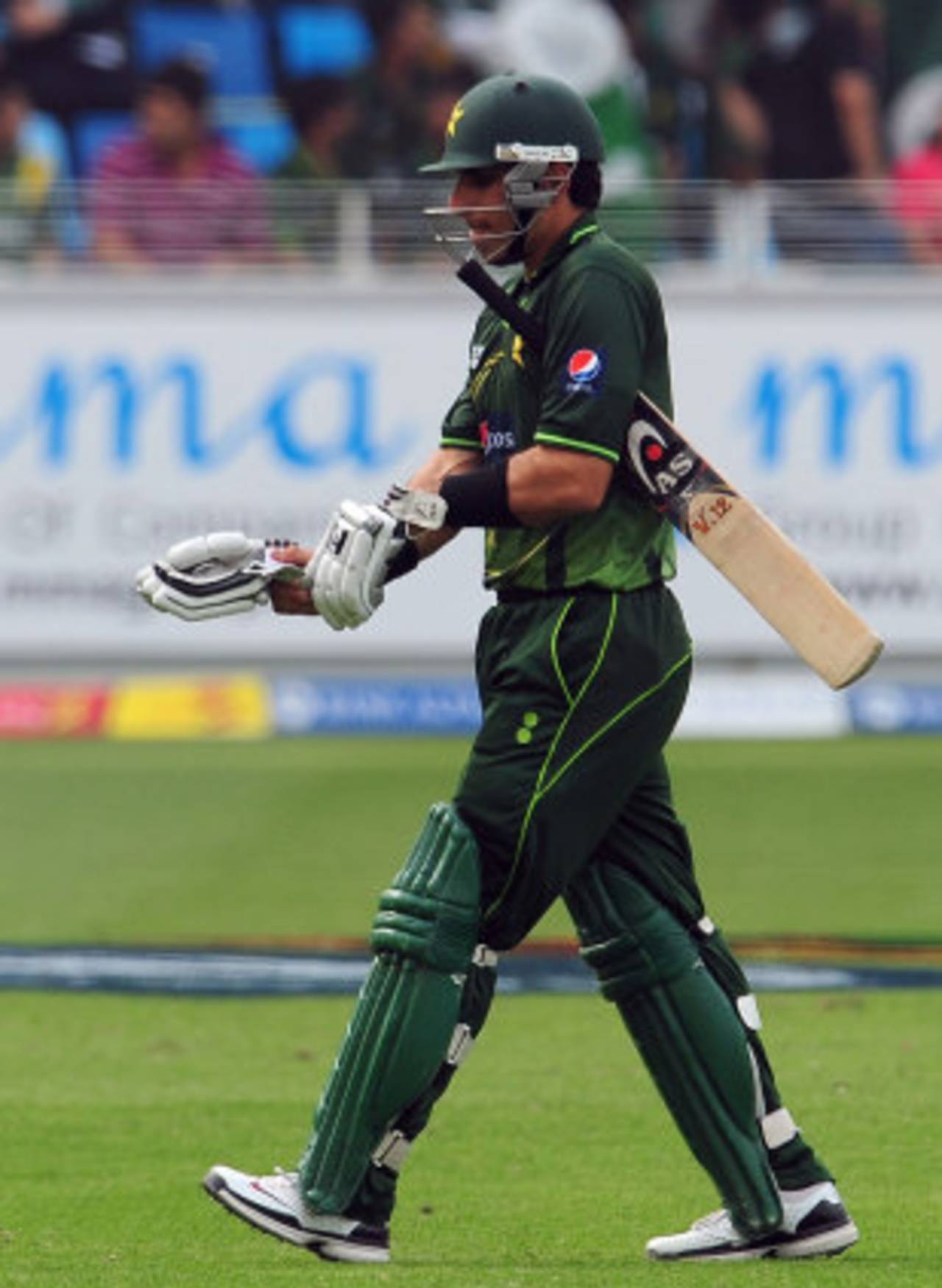Opportunity in lifeless surrender
Pakistan's splendid over-achievement in the Test series preceded lifeless surrender in the one-day sequel
Kamran Abbasi
25-Feb-2013

Misbah ul Haq read correctly that Pakistan were in a selection muddle; Shoaib Malik wasn't the answer. • AFP
Pakistan's splendid over-achievement in the Test series preceded lifeless surrender in the one-day sequel. In the equation of whitewashes, Tests carry more gloss but Pakistan's crash back to earth is a reminder that the recent dominance of Misbah-ul-Haq's team in the UAE will be a mirage unless deep foundations are laid by the Pakistan Cricket Board.
Good teams fail intermittently but Pakistan were consistently woeful in this one-day series, a shockingly poor performance considering form in an environment that suits them. Pakistan failed to muster even one decent effort. The emptiness that England's supporters experienced only a week or ago was transferred to Pakistan's.
The most dismal moment was the selection for the final match. Misbah and Mohsin Khan opted for a lone fast bowler, one who had been kicking his heels most of the tour, to go with the potential of five spinners. One among the spin quintet was Shoaib Malik, a shadow of his former self since he was forced to modify his action. The poverty of logic in Pakistan's camp was confirmed by a decision not to select budding allrounder Hammad Azam or a second fast bowler. Even dropping Imran Farhat, scourge of supporters, offered little solace.
The series started badly and never recovered. The first alarm bell was Misbah's decision to use his influence over the selection of Malik, a captain's autocracy that invariably leads to unhappiness except for when it was once exercised by Imran Khan. To his credit, Misbah read correctly that Pakistan were in a selection muddle; the selected squad was inadequate and needed bolstering. Malik wasn't the answer.
In defeat, the focus inevitably fixes on the captain, and Misbah did little else to help his cause. His voice and body language after losing the toss in the first two matches were of a man defeated by circumstance. Pakistan's generally inhibited and defensive approach to the series bore his hallmark; a winning strategy for the Test arena isn't usually appropriate for limited-overs cricket. It was a surprise to see a Pakistan team apply such little pressure on the opposition with bat or ball.
Misbah's tactics have brought success in this format, although he has been rescued too frequently by the individual performances of Shahid Afridi, Mohammad Hafeez and Saeed Ajmal. Afridi and Hafeez were below par in this series. Their failure exposed Pakistan's strategy to the extent that there didn't seem to be much of one. Personnel were shifted with little purpose and the management team were slow to react to events and form.
Pakistan seemed little bothered to perform let alone win, a mindset that can prevail when a one-day series follows Tests. But that is no excuse. A defeat would have been acceptable had it helped the future development of this Pakistan team. That was not the case here. Pakistan need to plan with the 2015 World Cup in mind, decide who of the current group will remain a core player in three years, and nurture younger players to fill the obvious gaps in this team.
That process might lead to thoughts of a different captain, even though Misbah should certainly remain at the helm of the Test team, but it does require urgent attention to other areas. Azhar Ali might be the answer to the one-day opening slot but that leaves holes in the middle order alongside the emerging talent of Asad Shafiq and the frustrating talent of Umar Akmal. Hammad Azam needs to be tested in Abdul Razzaq's old role of batting allrounder, and the management team must decide who partners Umar Gul with new and old ball out of Junaid Khan and Wahab Riaz. This leaves the wicket-keeping slot where a trilogy of Akmals has failed to convince for differing reasons.
One failure should not overshadow the many unexpected successes of the past 18 months, but it serves an important purpose since the flaws in the current squad and tactics can no longer be ignored. The PCB must take a longer view and build a new team for the 2015 World Cup, and the new regime's response to this series will help us measure the extent of its capabilities and ambitions.
Kamran Abbasi is an editor, writer and broadcaster. He tweets here